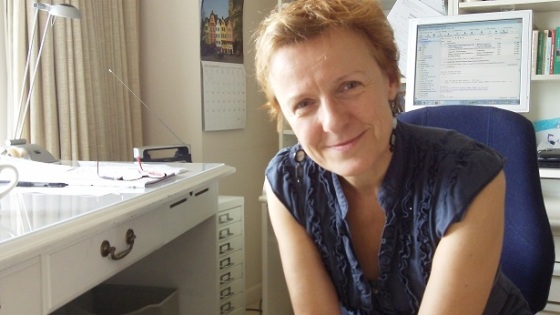Dorothea Hahn sips on her licorice tea and points out of the big window front that fills her study with ample sunlight.
“I live right beside the river here. Because of the time difference [with Germany] I get up early, at 5am or 6am. And even though it is dark at that time most of the year, all these stressed-out Washingtonians are out there already, jogging by the river. Then afterwards, they will go to their offices, to climb the career ladder. I think this city is not relaxed, it is a career-driven city full of officials,” she says.
A Cologne, Germany, native, Hahn moved into her apartment in southwest Washington, D.C., two and a half years ago. Before that, she worked as a German newspaper correspondent in Paris for ten years. For Hahn, it was a culture shock when she traded Paris for Washington, D.C.
“In other cities, even in capitals, people make more time to actually enjoy themselves,” Hahn says.
It was strange for her when she received a party invitation that gave her not only the start time, but also the end time of the get-together. And, she says, those end times in D.C. are extremely early. “That is Washington for you,” Hahn smiles.
Dorothea Hahn works for the Berlin-based, left-wing German newspaper die tageszeitung. As the newspaper’s only U.S. correspondent, she covers mostly politics for the paper and recently attended both the Republican National Convention in Tampa, Florida, as well as the Democratic National Convention in Charlotte, North Carolina.
While she enjoys traveling the nation and getting to speak to the everyday American, Hahn says both the conventions were nothing like that at all. “It was like inside a bubble. The people at the conventions, the ones that make politics, are an absolute minority in the country. Tampa especially was completely insular, a convention center guarded by heavily armed policemen. I didn’t get to speak to people outside of the convention at all.”
When trying to interview officials in the D.C. area itself, she has encountered problems as a German journalist. Hahn found that politicians in D.C. are constantly campaigning, and that it is hard for her to get a hold of an official as a reporter who does not represent a group of American voters. That is why she benefits from the traveling as well. “My work takes place mostly outside of the city. It is easier for me to get a statement from an El Paso congressman if I meet him in El Paso, and not in Washington, D.C.,” Hahn says.
That does not count for interviews with the everyday American. In fact, Hahn says she was surprised how friendly and open Americans have generally reacted to her approaching them, especially when they learned that she was German. “They often seem to see me as a remote cousin. A lot of Americans identify with their German heritage. I never expected that at all,“ Hahn says. The same applies to her German accent. “I don’t think that having an accent is a handicap in this country. And certainly not a German accent.”
This pro-German attitude reflects in the census. In 2009, almost 51 million Americans claimed to be of German ancestry, representing the largest ancestry group even before the Irish group (37 million).
Hahn says that a general American hospitality and friendliness has made it very easy for her to settle in from the very start, especially when she arrived in D.C. three months before her furniture did. Her neighbors provided her with all she needed – a mattress, cutlery, bed linens – without Hahn even asking for it.
And while she criticizes D.C. for being pretentious – “It is a ‘business card city’” – she enjoys that it offers plenty of outdoor activities. Hahn doesn’t have a car and cycles everywhere, and she goes paddling on the Potomac whenever she can find the time. Which comes with dangers: an excursion on the boat left her capsized a couple of days ago. “I still have a little cold from it,” Hahn laughs and quickly finishes her tea.
Dorothea Hahn has to rush to her next appointment. She doesn’t have a lot of time these days. The elections are drawing closer and her German editors are waiting for more reports.
Note: Correction –
Dorothea Hahn in fact worked in Paris for fifteen years, not just ten years as stated in the article. – Julia Broemmel, Sept. 18, 2012
